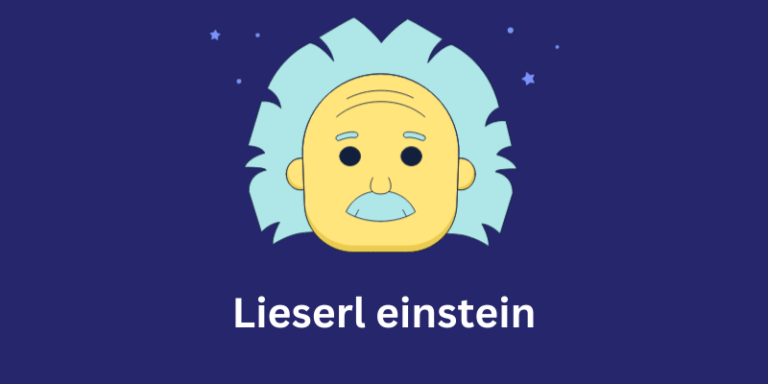Albert Einstein, the name synonymous with genius, has left a towering legacy in science. But behind the iconic image of the wild-haired physicist lies a personal story that is less well-known—one that involves his first child, Lieserl Einstein. For many years, Lieserl remained a mystery, hidden from public knowledge. So, who was Lieserl, and why is her story so shrouded in mystery?
Who Was Lieserl Einstein?
Lieserl Einstein was the firstborn child of Albert Einstein and Mileva Marić. Born in 1902, just before Einstein’s rise to global fame, Lieserl’s existence was kept largely secret, and she disappeared from historical records early in her life. The reasons for this secrecy and the details of what happened to her remain unclear, leaving historians and researchers to speculate.
Albert Einstein’s Relationship with Mileva Marić
Before delving into Lieserl’s mysterious life, it’s important to understand Einstein’s relationship with her mother, Mileva Marić. Mileva was not only Einstein’s first wife but also a brilliant physicist in her own right. Together, they formed an intellectual partnership that laid the groundwork for Einstein’s scientific breakthroughs, including his early work on the theory of relativity.
Early Correspondence Between Einstein and Mileva
The most significant clue to Lieserl’s existence comes from letters exchanged between Einstein and Mileva. In these letters, written before their marriage, Einstein mentions the pregnancy and the challenges they face in caring for their first child.
The Challenges of Their Relationship
Despite their shared passion for science, Einstein and Mileva’s relationship was strained by personal and academic pressures. The demands of Einstein’s career, combined with societal expectations, likely contributed to the decision to keep Lieserl’s birth hidden.
Lieserl’s Birth: A Hidden Affair
Lieserl was born in January 1902, a year before Einstein and Mileva married. At that time, the couple lived in Serbia, away from the public eye. Given the societal norms of the early 20th century, having a child out of wedlock was a significant scandal, especially for someone of Einstein’s emerging stature in the academic world. This may explain why Lieserl’s existence was kept secret.
Lieserl’s Illness
Historical evidence suggests that Lieserl may have been born with a medical condition, possibly scarlet fever. Letters exchanged between Einstein and Mileva show concern for her health, and one letter hints at her deteriorating condition.
Lieserl’s Disappearance from History
After a brief mention in Einstein’s letters in 1903, all references to Lieserl suddenly stop. This abrupt silence has led historians to theorize about what may have happened to her. Did she die young? Was she given up for adoption? The lack of concrete evidence fuels both academic and public speculation.
Adoption Theories
One popular theory suggests that Lieserl was given up for adoption, possibly to relatives in Serbia. However, no official documentation has been found to confirm this.
Death Theories
Another possibility is that Lieserl passed away at a young age due to her illness. Some researchers argue that she may have succumbed to scarlet fever or another disease, which would explain the sudden end of references to her in Einstein’s correspondence.
How the Discovery of Lieserl Came to Light
For decades, Lieserl’s existence remained unknown. It wasn’t until 1986, when a collection of Einstein’s letters was discovered, that the world learned about her. The letters, which had been kept private for decades, revealed the details of Lieserl’s birth and the concerns surrounding her health.
Lieserl’s Impact on Einstein’s Life and Work
Although there is no direct evidence that Lieserl’s brief life had a lasting impact on Einstein’s scientific work, it’s possible that the emotional weight of her existence influenced his later philosophy. Einstein’s deep commitment to humanitarian causes and his complex views on family life could be seen as reflections of his personal experiences.
A Possible Influence on Einstein’s Theory of Relativity
Some historians have speculated that the emotional turmoil of losing a child may have indirectly influenced Einstein’s work on relativity. While this is purely speculative, it adds a layer of human complexity to the story of one of history’s greatest minds.
Mileva’s Role in Einstein’s Success
Mileva’s contributions to Einstein’s early work cannot be overlooked. Some scholars believe that she played a significant role in shaping his early ideas, making their partnership both personal and intellectual.
The Role of Women in Einstein’s Life
Lieserl’s story also sheds light on the often-overlooked role of women in Einstein’s life. While Einstein is remembered for his genius, his relationships with the women closest to him, including Mileva, were complex and often fraught with difficulties.
Why Lieserl’s Story Matters Today

The discovery of Lieserl Einstein is more than just a footnote in Einstein’s biography. It highlights the hidden histories of women and children in science, as well as the emotional and ethical complexities that often accompany the lives of great figures. Lieserl’s story serves as a reminder that even the most celebrated individuals have personal challenges and secrets.
The Ethical Dilemma of Einstein’s Legacy
Lieserl’s story raises ethical questions about how we view Einstein’s legacy. Can we separate his scientific achievements from his personal life? The discovery of Lieserl invites us to reconsider how we assess historical figures, balancing their public accomplishments with their private choices.
Lieserl in Popular Culture
In recent years, Lieserl’s story has captured the imagination of writers and filmmakers. Her brief, mysterious life has been depicted in various forms of media, reflecting the public’s fascination with Einstein’s family and the hidden aspects of his personal life.
Conclusion
Lieserl Einstein remains a mystery to this day, but her story adds depth to our understanding of Albert Einstein as both a man and a scientist. While we may never know the full details of her life, the discovery of her existence has opened new avenues of exploration into the private life of one of history’s greatest minds. Lieserl’s story reminds us that behind every genius, there is a human being with complex emotions, relationships, and challenges.
FAQs
1. Who was Lieserl Einstein?
Lieserl Einstein was the first child of Albert Einstein and Mileva Marić, born in 1902. Her life remains a mystery, as she disappeared from historical records early on.
2. What happened to Lieserl Einstein?
The fate of Lieserl is unknown. Some theories suggest she may have died young due to illness, while others speculate she was given up for adoption.
3. Why was Lieserl’s existence kept secret?
Lieserl was born out of wedlock, which was socially unacceptable at the time. This likely contributed to the decision to keep her birth hidden from the public.
4. How was Lieserl Einstein discovered?
Lieserl’s existence was revealed in 1986 through the discovery of letters exchanged between Albert Einstein and Mileva Marić.
5. Did Lieserl’s story influence Albert Einstein’s work?
While there is no direct evidence, some speculate that the emotional weight of Lieserl’s existence may have indirectly influenced Einstein’s later life and philosophy.

